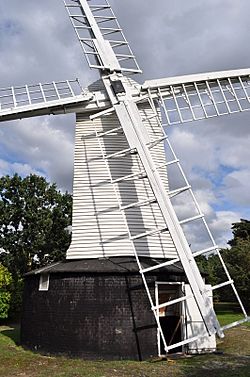Holton Windmill facts for kids
Quick facts for kids Holton Windmill |
|
|---|---|

The mill in 2011
|
|
| Origin | |
| Mill name | Holton Mill |
| Mill location | TM 402 774 |
| Coordinates | 52°20′33″N 1°31′31″E / 52.34238°N 1.52525°E |
| Operator(s) | Suffolk County Council |
| Year built | 1749 |
| Information | |
| Purpose | Corn mill |
| Type | Post mill |
| Roundhouse storeys | Two storeys |
| No. of sails | Four sails |
| Type of sails | Two Spring sails, two Common sails |
| Windshaft | Cast iron |
| Winding | Fantail |
Holton Windmill is an old windmill located in Holton, Suffolk, England. It was built a long time ago and is now protected as a Grade II listed landmark. This means it's an important historical building. It is a special type of windmill called a post mill.
Contents
History of Holton Windmill
Building the Mill
Holton Mill was built in 1749 by a person named John Swann. For many years, different people owned and operated the mill.
Changing Owners
William Fiske owned the mill until 1761. Then, Brame Oxford bought it. In 1781, James Tillot took over the mill. Later, John Tillot owned it until 1835. At this time, the mill was described as having a roundhouse for the first time. A roundhouse is a building that goes around the base of the mill.
Samuel Wilkinson, a miller, bought the mill next. He sold it to John Youngs in 1851. After Youngs passed away, the mill was sold to Andrew Johnstone in 1861. He then sold it to Thomas Buxton in 1863. By 1886, the mill was for sale again. It even had a shed for an engine, which meant an engine was helping the mill work. The mill stopped working in 1910. After that, much of its machinery was removed. It was then used as a small summer house. A "fantail" was added around this time. A fantail helps the windmill turn to face the wind.
Saving the Mill
Over the years, the mill became very run down. In 1947, Colonel T S Irwin bought it. In 1949, a group called the Holton Mill Preservation Fund Committee was created. They started doing some repairs.
In the mid-1960s, East Suffolk County Council took over the mill. Big restoration work began in 1963. Many people helped with the restoration, including Mr and Mrs H Fisk, Marcus Cook, and Chris Hullcoop. They even got paint donated by ICI.
Restoration Efforts
The Society for the Protection of Ancient Buildings also helped. They talked with the council, and volunteers received a small grant. In 1964, Stanley Freese joined the team. The fantail was fixed, and some sails were taken down because they were not safe.
Experts decided that the mill was not strong enough to work again. So, they decided to restore it as a landmark instead. Lighter "Common sails" were put on the mill. The main body of the mill was also made stronger.
By late 1965, the wind could turn some of the sails again. In 1966, more repairs were done. This included a new roof and fixing the floors. Four new Common sails were added. The council took a new 50-year lease on the mill in March 1966. In 1992, new "Spring sails" were fitted. These were made to look just like the original ones.
What Holton Windmill Looks Like
Holton Windmill was built as an "open trestle" post mill. This means its main body sits on a large wooden frame. A roundhouse was added by 1835. The mill originally turned to face the wind using a long pole called a tailpole. Later, a fantail was added to do this automatically. The mill was also sometimes powered by a steam engine.
The mill has been made longer at both its front and back. It has two types of sails: one pair of Common sails and one pair of Spring sails. Inside, only the heavy cast iron "windshaft" and the "Brake Wheel" are left from the original machinery. The roundhouse looks like it has only one floor from the outside. But inside, it has been dug out to create two floors: a cellar and a ground floor.
Millers of Holton Windmill
Here are some of the people who worked as millers at Holton Windmill:
- Samuel Banell (around 1810s)
- William Taylor (1835–1845)
- William Wilkinson (1845–1851)
- Edward Gotta Young (1851–1870)
- William Gibson (1870–1910)
Visiting Holton Mill
You can usually see the outside of Holton Mill. Sometimes, you can even go inside. This is thanks to the landowner.
Images for kids
 | Mary Eliza Mahoney |
 | Susie King Taylor |
 | Ida Gray |
 | Eliza Ann Grier |


